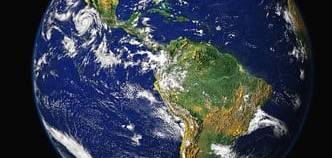
The starting point is simple. If we are to avert climate catastrophe, the world must reduce emissions of global warming greenhouse gases by 50% within the decade.
For many, such ambitious goals may seem unattainable.
Experts say there are many things we can do as individuals to address the climate crisis. At the top of the list: pushing governments and corporations to reduce the greenhouse gas emissions that are disrupting the Earth's climate.
Today we celebrate the 52nd Earth Day – an event founded in 1970 in response to growing public concern about the impact of human activity on the environment. The first Earth Day saw 20 million Americans – about 10% of the population at the time – take to the streets, to spark major social and political change and pave the way for the first 'Earth Summit'. of the United Nations in the world which was hosted in Stockholm in 1972.
International Earth Day is celebrated around the world on April 22. The 2022 theme “ Investing in Nature ” highlights the urgent need to close the $ 4.1 trillion funding gap in nature by 2050 to meet global goals in terms of climate change, biodiversity and land degradation . UNEP's Finance for Nature report calls for a tripling of investments in nature -based solutions by 2030 and a quadrupling by 2050.
The first observers and researchers recognized an impending global crisis 50 years ago. Early consideration by various world leaders has taken a long time and real signs of action have been slow to arrive. Examples:
- It took 20 years for the UN to adopt the Framework Convention on Climate Change (UNFCCC, 1992) which recognized human contributions to increasing concentrations of greenhouse gas emissions ( GHG) in our atmosphere and committed to tackling the climate crisis.
- It took another five years for the world to accept the Kyoto Protocol (1997) to 'operationalise' this commitment, setting specific targets for developed countries to limit GHG emissions. Even then, the targets did not come into effect until eight years later, in 2005, by which time more than a decade had passed since world leaders pledged to take collective action to reduce emissions.
- It took another 10 years (2015) for the historic Paris Agreement to be concluded. The Accord set the ambitious goal of “limiting temperature rise to 1.5°C” (beyond which devastating climate change will occur) and that countries pledge to make determined contributions at the national level to define the measures they are taking to achieve this goal .
“It can feel overwhelming to think about the climate crisis, but we need everyone on deck right now,” said Niklas Hagelberg, Program Coordinator of the United Nations Climate Change Programme. Environment (UNEP) on Climate Change. “Through collective action, people can truly reduce emissions substantially and build their resilience to climate change. »
Especially since the latest IPCC report made public a few days ago has added pressure and an increased sense of urgency by indicating that we have a " narrowing window of opportunity" for prevent irreversible climate damage. In other words, we have no time to waste.
UNEP recently launched Act Now: Speak Up , a campaign that shows how citizens can compel governments and businesses to up their climate game. Its goal is to spur the kind of systemic change that Hagelberg says will be crucial to limiting global warming to 1.5°C above pre-industrial levels, considered a red line for Earth.
We can, both collectively and individually, address the climate crisis . Political action remains the most effective. Without strong political will, no ambitious, measurable and quantifiable objective can be achieved. It is therefore essential that everyone uses their voting power to send a strong message to our leaders that we must take climate action more seriously. The objectives and means of action are known: achieve the objectives of the Paris Agreement, increase the transparency of climate policies and devote resources to adapting to existing climate challenges, shift subsidies from fossil fuels to renewable energy and energy efficiency, s engage in ecosystem restoration projects and use public funds to finance green technologies and innovation.
Companies also have an important role to play and they must be encouraged to act
Companies must promote sustainability – not only to protect the planet, but also to ensure their own long-term stability.
Investments must have a positive impact
Sustainable development can be supported by choosing socially responsible financial institutions, such as those that are signatories to the UNEP Finance Initiative (UNEP FI). A UNEP FI organizes alliances dedicated to net-zero emissions goals in the areas of Emissions . The 400 signatory investors, banks and insurers all set high standards for green investments.
Why not volunteer in your community
With environmental issues affecting a growing number of people, there are more opportunities than ever to help your community. You can support public campaigns to raise awareness of the climate crisis by taking part in marches and signing petitions.
If you are able to get more practice, you can join efforts to restore damaged ecosystems and organize ecosystem restoration projects yourself. These include restoring and rewilding ecosystems. Additionally, citizen science opportunities can help UNEP and environmental groups better coordinate action around the world.
Talking to those around us – whether they are environmentally conscious or not – is a simple but effective way to tackle the climate crisis.
The simplest way to do it can also be incredibly effective.
Source
- UNEP (United Nation Environment Programme)
Posted on 2022-04-22 10:06








Comments